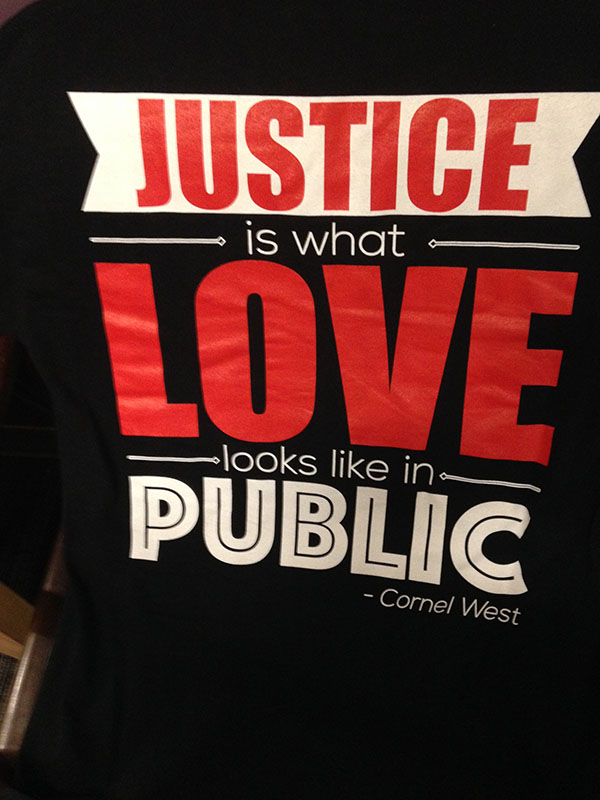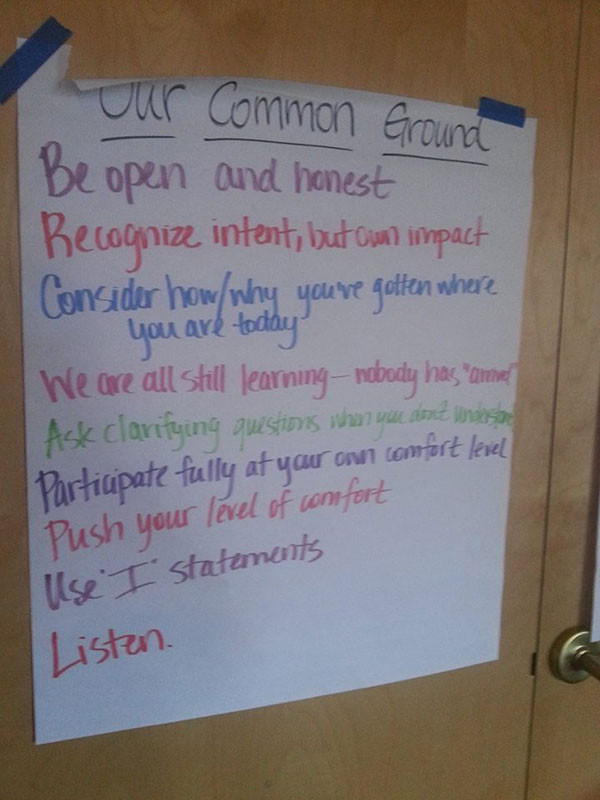BOONE, N.C. — Everyone has a story. If we each knew these stories, would we have more understanding and compassion toward others?
In late March, 55 Appalachian State University students participated in a three-day INTERSECT Social Justice Retreat to understand concepts of social justice and leadership by exploring their own stories, the stories of their classmates and issues of oppression and privilege. With the help of 12 staff facilitators, they practiced skills in personal communication, how to be open and honest, how to value and appreciate others and how to build alliances to affect change.
The students and facilitators represented differences in race, sexual orientation, gender identity, religion, class, ability, age and citizenship. The level of experience in social justice and leadership varied as well – from those already engaged in causes, to others with a basic understanding of social justice but a desire to do more.
The intended result: empower students to take positive action back home on the Appalachian campus and elsewhere. Comments during and after the retreat included:
- “The biggest thing I learned was that by staying silent I am contributing to the problem.”
- “I’m learning how to start conversations and to help others talk and open up conversation.”
- “I plan to love the students at Appalachian State better. I’m going to continue to show grace to those who are ignorant to the subject.”
- “I will participate more in groups I didn’t know about before.”
- “I’m learning how to ask questions.”
- “I’ve deepened my appreciation of difference.”
Outcomes of INTERSECT
INTERSECT is among leadership development programs offered by Appalachian's Center for Student Involvement and Leadership.
Coming into INTERSECT, which was held off campus near Asheville, some students had little exposure to the experiences of different races or to the experiences of people who identity as other than heterosexual or the gender they were born with. Others felt alone in their push for social justice or were afraid to speak up against socially accepted attitudes. Some feared their stories wouldn’t be honored, others worried they wouldn’t fit in.
What they discovered is that everyone at the retreat cared, even if they didn’t always agree.
“I volunteered to go to represent my ministry and educate the rest of my ministry about social justice issues. Personally, I learned so much,” said Mat Clodfelter.
He described himself as being “ignorant” before the retreat of how society marginalizes and oppresses some people.
“However, I learned that despite all of that, it’s how you use your privilege. Are you going to continue to not be aware of social justice issues? Or are you going to use your privilege to educate and make change happen?” Clodfelter said.
Jordan Canterbury said that at Appalachian, “I’ve felt afraid to speak up because I didn’t want to jeopardize my relationship with the other person. However, the retreat showed me that in the grand scheme of things, if I prove myself as an ally to all kinds of folks, I’ll have allies when I need them, too. I don’t feel quite so afraid to take a loss if I speak up, because the loss is irrelevant compared to the ‘victory’ I would be helping bring.”
Canterbury is now involving himself on campus in new ways, opting for diversity-centered positions rather than the “more popular” ones in his clubs and organizations.
Core objectives of INTERSECT
The core objectives of the INTERSECT social justice retreat were to:
- understand one’s own cultural backgrounds
- listen to the experiences and stories of others
- learn about the roots of specific forms of oppression and privilege
- discover ways to address everyday bias, stereotypes and discrimination as an ally (or someone who isn’t personally impacted, but who is responsible based on their privilege)
- describe and exemplify ways to create positive change and promote inclusion on campus
- encourage coalition building between individual students and groups/organizations across differences.
“The INTERSECT Social Justice Retreat provided a safe space for students to explore their individual identities and develop a deeper understanding of power, privilege and oppression,” said Dustin Evatt, assistant director in Appalachian’s Center for Student Involvement and Leadership. “They engaged in real conversations about critical issues affecting our campus community.”
The retreat also created a space for students to challenge their assumptions about societal and institutional norms and the impacts of those norms on individual people, he said. For example, one of several group agreements for the weekend was to “recognize intent but own impact” – meaning, while a person may not have intended to offend someone with a comment, it might have hurt someone and then to take ownership of the hurt that comment may have caused.
Participants were encouraged to develop contacts during the retreat so they could form support networks across campus and be allies for each other. They are keeping in touch through a private Facebook group, through which they have been promoting events, fundraisers, and causes both on campus and in the national and global communities.
Appalachian’s INTERSECT Society Justice Retreat was modeled after the Next Step Retreat at the University of Vermont that was collaboratively developed by student affairs professionals, students, faculty and social justice educators hoping to make a positive impact in their community. Colorado State University hosted the first Next Step program in 1994.
This retreat was made possible by the financial support of the UNC Association for Student Governments and Appalachian’s Student Government Association, Office for Equity, Diversity, and Compliance, and Office of the Chancellor.
One student’s poem about the retreat
In the beginning of the journey, I felt scared
and unprepared.
Not knowing feels as demonizing as being the problem.
The thing I learned is no one is perfect,
so I felt safe to open up.
Everyone was kind, thoughtful, compassionate and
made the “Appalachian Family” true for one weekend.
Recognizing our differences in background, thoughts and experiences,
Something I learned is there is more than one way to fix a problem. In fact,
there are multiple problems with multiple solutions.
Entering this space felt empowering. Then, building an even better space felt humbling.
Community starts with compassion.
Together, we can move mountains.
What do you think?
Share your feedback on this story.
About Appalachian State University
As a premier public institution, Appalachian State University prepares students to lead purposeful lives. App State is one of 17 campuses in the University of North Carolina System, with a national reputation for innovative teaching and opening access to a high-quality, cost-effective education. The university enrolls more than 21,000 students, has a low student-to-faculty ratio and offers more than 150 undergraduate and 80 graduate majors at its Boone and Hickory campuses and through App State Online. Learn more at https://www.appstate.edu.






![How NCInnovation Is Rethinking Economic Development in North Carolina [faculty featured]](/_images/_posts/2026/02/rethinking-economic-development-600x400.jpg)








